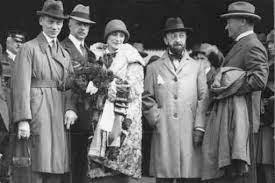★ ★ ★ ★ 4 diapasons pour “À la lueur du timbre”
★ ★ ★ 3 diapasons pour “Le dernier impressionniste”
C’est de l’aquarelle musicale.
Giosmin y met de l’esprit et de l’invention.
(G. Condé dans Diapason 01/2026)
We praise this discovery
(record of the week, ★ ★ ★ ☆ De Standaard)
Il n’y a pas que Debussy et Ravel dans la vie…
(passage à Radio France)
This is an attractively recorded and well
documented disc with notes by Giosmin, who
performs throughout with great panache and sensitivity.
(Musicweb International)
Nicola Giosmin shows off a technique
up to the difficult demand of this repertoire
(★ ★ ★ ★ ☆ Rivista Musica)
… amazing piano recital of Giosmin Nicola…
(★ ★ ★ ★ ☆ il manifesto)
Congratulations to Nicola Giosmin
who masters this music with authoritativeness
(Thierry Vagne)
About
On the 9th of June 1911, at the Salle Gaveau, an anonymous concert, patronized by the Société Musicale Indépendante took place : the public must identify blindly the composers. The programme included : Sachs, Inghelbrecht, Büsser, Ravel, the «interloper» Couperin and… Lucien Wurmser. According to Milhaud « The outcomes were absurd ! ». Who is that musician, famous during his lifetime, among other more known composers ?
! ». Who is that musician, famous during his lifetime, among other more known composers ?
The aim of this project is to provide for a first recording of the essential of Lucien Wurmser’s piano music. More information on Wurmser piano music.
Biography
Born in Paris in 1877, Lucien Wurmser began studying the piano at the age of six. At nine, he was admitted to the Paris Conservatory, where he studied with Descombes, Grandjany, and Lavignac. He progressed to the advanced class of Charles-Wilfrid de Bériot, who also taught Ravel and Viñes during that time. In 1893, Wurmser won his Premier Prix (first prize) at just sixteen. He then launched his international career as a virtuoso pianist and conductor. He became well-integrated into the Parisian musical scene, premiering works by Debussy and Saint-Saëns. In 1903, he married harpist Lucile Adèle Delcourt, and in 1905 he founded his own music school in Paris, with branches across France. Two years later, he applied for a post to succeed Marmontel, competing against candidates like Cortot, who ultimately won the position.
Between the wars, Wurmser continued both his performing and teaching careers, although in 1922, he had to suspend his “Association des grandes auditions,” which offered contemporary music programs at extremely affordable prices, featuring composers like Fauré, D’Indy, Ravel, Debussy, Dukas, Chabrier, Koechlin, and also Stravinsky and Borodin.

His famous Australian tour in 1926 as a conductor with Anna Pavlova is still remembered. During the 1930s, after his wife passed away, he remarried one of his students, Madeleine Mur, and became the stepfather of composer Bernard Parmegiani. He continued his career in Paris and other cities like Rennes and Nevers, and he didn’t shy away from more popular activities such as creating an orchestra to support struggling musicians and directing an association for unemployed musicians.” After World War II, he resumed his work as pianist, teacher and composer until his death in 1967.
A reserved but accomplished musician, Wurmser devoted his life to music, excelling as a pedagogue and pianist, though never achieving wide recognition as a composer. His extensive repertoire included works by Chopin, Schumann, Liszt, Fauré, D’Indy, Saint-Saëns and Debussy (here his renditions of La plus que lente and Toccata, here Danse de Puck and Bruyères). He collaborated with many chamber musicians, including violinists Jacques Thibaud, André Asselin, George Enesco, cellists Paul Bazelaire, André Hekking, and pianist Raoul Pugno, among others.
After his death, a competition bearing his name was organized by his association for a few years, before eventually fading into obscurity.
Dedication [for the entire project]: to F.
The entire Wurmser’s piano music recording would not have been possible without the sparkling inspiration of a very special, unique and magic human being: F. Her strong disagree on this (and on other points) is due to her unjustified modesty, which makes her tremendous power even bigger to my eyes. Anyway, in spite of her scepticism (and it is my turn to respectfully disagree), my debt of gratitude to her is inextinguishable. I owe her so much, too much, in any case much more than could be expressed by some words on a web page.
To F. : barely (if not) interested, always speechless, steadily refusing, but maybe… at least hopefully listening to it.